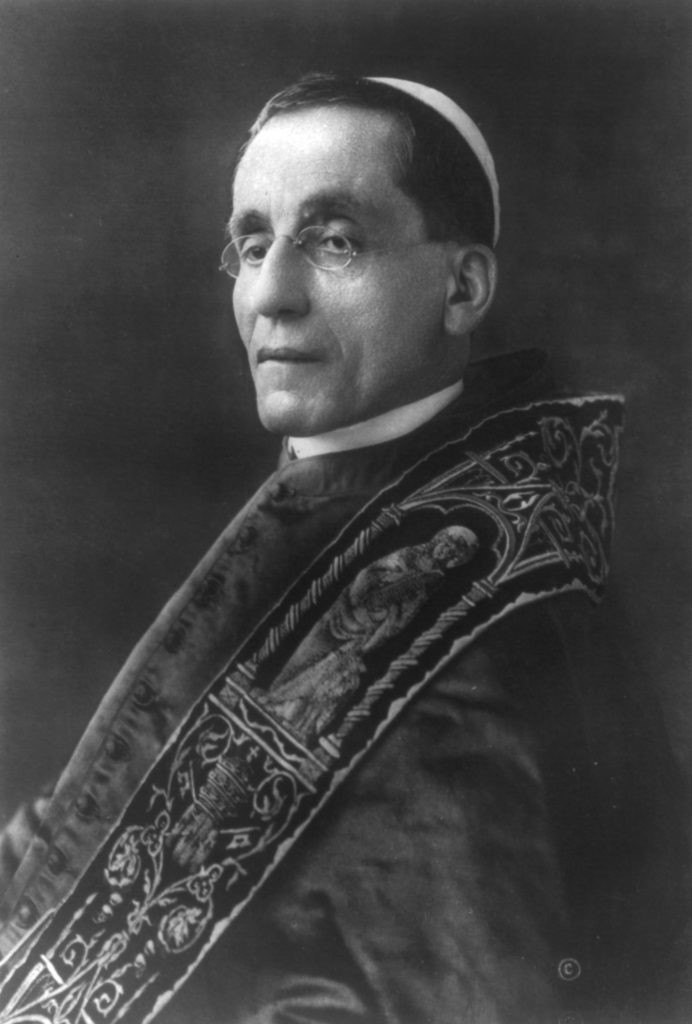PHOTO CAPTION: Pope Benedict XV (1914-1922) Benedict XV revitalized missionary activities after World War I. He has been referred to as the “Pope of Missions.” Benedict XV was devoted to the Blessed Virgin Mary and authorized the Feast of Mary, Mediatrix of all Graces. (Photo from Wikipedia.)
-
Marco Carvalho
The apostolic letter Maximum Illud, issued a century ago by Pope Benedict XV, reinforced the Catholic dimension of the Church, by reaffirming the importance of the diversity of theological, liturgical and spiritual expressions as a central aspect of the unity of the faith. The approach was advocated Wednesday night by Father João Eleutério on the third of six lectures about Maximum Illud.
Father João Eleutério is back to Macau less than six months after leaving the Special Administrative Region and he was the invited guest of the third of six lectures with which the Faculty of Religious Studies of the University of San José marks the hundredth anniversary of Maximum Illud.
The document is seen by many as a cornerstone of the modern Church and the Portuguese scholar maintains that it helped to reinforce the idea of Catholicity of the Church. By promoting the indigenization of the clergy involved in the evangelization efforts, the apostolic letter aligned the Church to the original guidelines of the legacy of Christ: “The idea of diversity is very much in the genes of the Church,” the coordinator of the doctoral program of the Portuguese Catholic University said. “The fact that Jesus chose twelve disciples to continue what was seen as his mission means that his mission continues, but it continues in a quite varied way. It is the same mission, but given a new life by different voices, different lives, different ways of being,” Father Eleutério added.
In addition to fostering the indigenization of the clergy and the very liturgical expressions with which the presuppositions of evangelization began to materialize, Maximum Illud liberated the Church, by removing it from the shadow of human ambition and temporal power: “It is important to realize that Maximum Illud is enacted in the aftermath of various movements that led to the laws of separation between the Church and the State in such countries as France, Brazil or Portugal. In fact, it forced the Church to assume its own nature: we will not be someone who is at the service of a State or a Government,” stressed João Eleutério.
“These two realities are very interesting. One hundred years later, the Church has no problem at all in assuming the separation of Church and State and the clergy is completely diverse. Macau is a very concrete example of this aspect: there are local priests, but also missionaries who come from elsewhere and settle here,” said the scholar.
In the opinion of João Eleutério, the apostolic letter Maximum Illud greatly anticipated the Second Vatican Council, by making it clear that the endeavors of evangelization are a responsibility of each and every Catholic, not just of a small group of chosen ones. The document issued a hundred years ago by Benedict XV has effectively allowed the word of God to reach everywhere: “Maximum Illud appears in a context in which there is still a set of missionary dynamics. There was a Christian presence – Catholic presence – in territories such as the Philippines, for example, but it had not yet reached everywhere,” Father João Eleutério pointed out. Maximum Illud will, in fact, generate a missionary dynamism that will make the Church well aware that to be a missionary is a responsibility that every single believer should share,” said the visiting professor of the University of Saint Joseph.


 Follow
Follow


